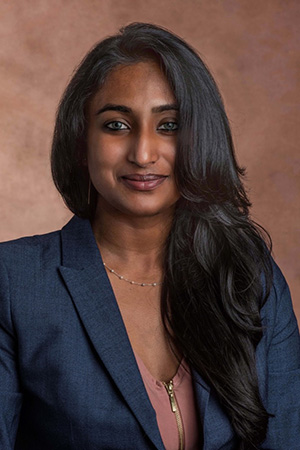Faculty Spotlight
For Sravani Alluri, MD, her work – and passion for – leading Street Medicine Kalamazoo (SMKzoo) at Western Michigan University Homer Stryker M.D. School of Medicine (WMed) is rooted in a deep desire to break down systemic barriers and bring medical care directly to those in need in the unhoused community in Kalamazoo.

The initiative, launched in 2021, aims to address what is an overwhelming need in the city by providing care for all with respect and dignity – and justice. The work for the interdisciplinary team can be taxing at times due to limited resources and funding.
But it’s also important and rewarding – and impactful.
For all of those reasons, Dr. Alluri, who serves as an assistant professor in medical school’s Department of Family and Community Medicine, was named by YWCA Kalamazoo as this year’s recipient of the Dorothy I. Height Social Justice Award.
Dr. Alluri and other award recipients were recognized on Thursday, May 22, 2025, at the YWCA Kalamazoo Women of Achievement Legacy Celebration.
“It’s an honor to be recognized in this way,” Dr. Alluri said. “It speaks to the work that our entire team has done and that WMed has been supportive of. We connect with our patients where they are and we build a support system around them where none exists.”
Dr. Alluri said she is honored to be recognized by the YWCA Kalamazoo and humbled that the award bears Height’s name. Height was a prominent civil rights and women’s rights activist who served as president of the National Council of Negro Women for 40 years. She was also a leader within the YWCA and was considered a member of the Big Six, a group of civil rights pioneers that included Martin Luther King Jr., James Farmer, John Lewis, A. Philip Randolph, Roy Wilkins, and Whitney Young. When she died in 2010, President Barack Obama delivered the eulogy at Height’s funeral service at the Washington National Cathedral.
Dr. Alluri said she feels that the needs Street Medicine Kalamazoo is able to address in the community falls directly in line with Height’s work to support others, to raise them up, and to change the system.
“That’s really what we do for our patient population,” Dr. Alluri said. “We raise them up through advocacy, we increase health system awareness, and we increase accountability for the health system to those patients, as well.”
Dr. Alluri’s push to start SMKzoo began during the COVID-19 pandemic when she was a Family Medicine resident at WMed. That work continued after she joined the medical school faculty in 2021.
Since then, the program has grown year over year. Dr. Alluri, along with Nic Helmstetter, MD, associate program director for SMKzoo and assistant professor in the departments of Medicine and Pediatric and Adolescent Medicine, and Sarah Darweesh, MD, assistant professor in the Department of Family and Community Medicine, and a host of resident physicians and medical students during their rotations and clerkships, now perform more than 1,500 clinical visits a year. In 2023, the team was featured in The New York Times and purchased a 2018 Ford Transit van that serves as a mobile clinic and has allowed the team to greatly expand its services to the community.
“We really provide care to patients who aren’t getting care anywhere else and we provide comprehensive services so they can overcome the barrier of not being able to get into a clinic for an appointment,” Dr. Alluri said. “Those relationships we’ve developed are so valuable and very personal as well.”
When she received her award at the Women of Achievement Legacy Celebration on May 22, Dr. Alluri got the opportunity to speak to those in attendance about Street Medicine Kalamazoo’s accomplishments, as well as the ongoing health needs of the unhoused in Kalamazoo and how SMKzoo is helping address those needs.
Dr. Alluri said the important work done by the team would not be possible without Drs. Helmstetter and Darweesh, student leaders within SMKzoo, as well as Teri Ault, RN, who serves as volunteer nurse manager; Terry Doxey, PharmD, who serves as volunteer pharmacist; EricaNoelle Destin, MSW, who serves as the team’s health navigator, and Pamela Wadsworth, PhD, WHNP-BC,RN, who serves as a part-time nurse practitioner and provides reproductive health services.
Since 1985, the Women of Achievement Awards have honored women who boldly advance social justice, racial equity, and systems change. This year’s ceremony was a legacy celebration honoring 140 years of YWCA Kalamazoo and the countless women who have made history along the way. Dr. Alluri was one of three honorees at the event who were celebrated for embodying YWCA Kalamazoo’s mission of eliminating racism and empowering women in their everyday lives.
“We are fighting every day for our patients and the care we provide,” Dr. Alluri said. “To be recognized for those efforts is really nice and I see this as a recognition not just for me but for the work of our entire team.”
If you are interested in supporting Street Medicine Kalamazoo, please visit give.wmed.edu or email the team at SMKzoo@wmed.edu.
